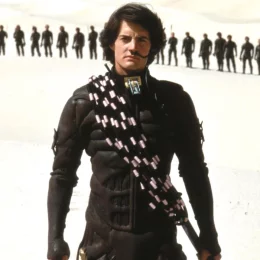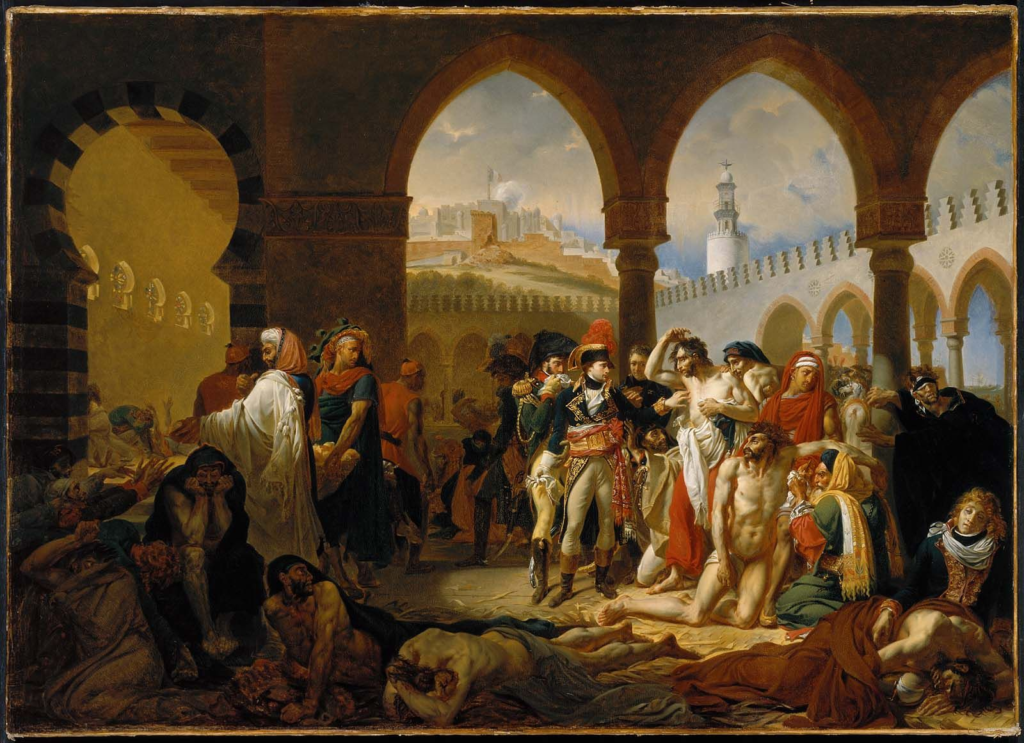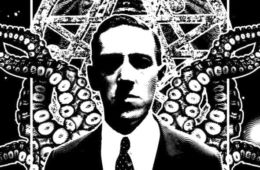“Sojourners in the Desert . . . Glad of Each Delay”: Meditations on the Drylands, Part II
Part 2 of 3 (Part 1 here)
II. Deserts Create Monsters and Messiahs
“The Bedouin could not look for God within him: he was too sure that he was within God — He could not conceive anything which was or was not God, Who alone was great . . . He was the most familiar of their words.” — Thomas Edward [T. E.] Lawrence, Seven Pillars of Wisdom
Egyptians of the Napoleonic era, having forgotten (or destroyed) the past, regarded the Sphinx with something akin to spiritual dread. Locals called it “Abdul-hol,” or “Father of Terrors.” For the most part they avoided the noseless, torso-less bust that jutted alarmingly out of the ground for seemingly no reason. Europeans interested in it, or other monuments like it, were “sorcerors,” those whites who braved ancient curses and managed to raise from the “lone and level sands” gold, fine jewelry, and other treasures. This wasn’t the only thing that worried the superstitious. Some “Turks” (or Muslims) of Egypt “believed that the predicted hour” was at hand, “when the power and religion of the Musselmen would be destroyed, and that a Yellow King [was] coming to establish a new empire.” But woe betide the French, Volney warned, if they invade this country, for “the Turks, Arabs, and peasants will arm themselves against them . . . fanaticism [taking] the place of skill and courage.”[1] In other words, fatwas and calls for jihad would with dizzying swiftness make the invader’s severed head the most coveted trophy in the “Musselman” world, while from all quarters the massed “faithful” would descend on him with the fury of provoked fire ants. But when have the disasters suffered by men on the hunt for Cíbola, or men on the march to utopia, ever mattered to men on the make?
The idea of a “Yellow King” or “Father of Terrors” might strike us as silly, but this mindset was typical of isolated desert people and their tendency to see messiahs and monsters everywhere. If their saviors were more awesome, then their enemies were more grotesque and horrifying. They lived in imaginations of the extreme, because the desert was extreme. The fear surrounding “Abdul-hol” was not much different from the ancient Egyptian fear of the jackal-faced god, known as the “Everlasting Devourer.” He “liveth in the Domain [of Fire] . . . The sinner who walketh over this place falleth down among the knives . . . Hail, Lord of Terror, Chief of the . . . Desert, who dost keep prepared the block of slaughter, and who dost feed on the intestines [of men]!”[2] This description of Anubis from the Egyptian Book of the Dead would resemble another bloody-minded god half a world away and many centuries later: the Aztec canine deity Xolotl, whom the Aztecs (originally from the northern deserts of modern Mexico) appeased with freshly-removed, still-beating human hearts.
Desert faiths probably began as a way to coax the rains, or for shaman-types to predict them – perhaps to warn of coming floods, sandstorms, droughts, or other weather-related catastrophes. In this manner, prophecies became a way of life and common to desert religions. What in the vast wastes separated man from the cloudless skies, from the cruel Sun? Only distant mountains, or the curvature of the very earth contained his horizons. He lived in a mostly hushed place. The movements of small animals – even insects – performing their nighttime rituals could sound shockingly loud. Move to the desert, and you, too, might become something of a mystic and sensitive to this alternately overwhelming and delicately subtle existence.
Indeed, though deserts nurture comparatively few flora or fauna, they excel at breeding fanatics. The doggedness with which the desert-dweller searches for water and sustenance in godforsaken places, translates into dogged, God-intoxicated belief. His Father is the stream in the desert, the oasis where the lion and the lamb drink their fill. Should his robust belief surprise us? Does the man of fertile soil, or temperate lands have the same need of God as he? Other latitudes prepare for the coming of winter, and deserts, having few seasons to reckon the time by, prepare for the Second Coming. Christianity itself spread outward from the desert adjoining the Dead Sea – ground-zero in which Christ wandered for 40 days and 40 nights. During this test of physical and spiritual fortitude,[3] a monster arrived to tempt Him three times: Prove that you are who you say. Turn this stone into bread, if you are hungry; “cast yourself” off this pinnacle, so that angels will catch you; become ruler of all the world, since you are the Son of God. Only after surviving the trials of desert and devil did Christ begin his ministry.
Likewise, from atop a barren promontory in the Caucasus Mountains, “black, wintry, dead, unmeasured,” beyond which lay the realm of the barbarii, humanity’s benefactor Prometheus suffered for us in a battle of wills with Jupiter.[4] Each day, the jealous god sent a sharp-taloned bird to rip out Prometheus’ liver. The wind howls, the eagle cries, and the jackal snarls. There is no halfway conviction, or lukewarm faith when the desert demands all of you – including your internal organs.
The many Dune fans at Counter-Currents know that Frank Herbert’s protagonist Paul Atreides (Muad’dib) made sense only on the desert planet of Arrakis. Indeed, the first lines of the novel were words from a holy book that chronicled the prophet-messiah’s deeds:
Take the most special care that you place [Muad’dib] in his time . . . And take the most special care that you locate Muad’dib in his place: the planet Arrakis. Do not be deceived by the fact that he was born on Caladan [an ocean planet] and lived his first fifteen years there. Arrakis, the planet known as Dune, is forever his place.[5]
Even before “the One” arrived to lead the Fremen (the mysterious natives on Arrakis, isolated and beholden to none), Paul dreamed of Dune’s holiness. In a vision, he saw “an Arrakeen cavern, silent people all around him moving in the dim light of glowglobes. It was solemn there and like a cathedral as he listened to a faint sound – the drip-drip-drip of water.” From his harsh Arrakeen seat, he was fated, not simply to inherit the Atreides duchy, but to become god-emperor of Dune and of much of the known universe. A politician or courtesan might have acquired superficial “polish” in the cities, but “wisdom [came] from the desert.”[6] True tests of will and character; powerful, spiritual experiences, they appeared to desert-dwellers as flashes of insight under a sky hot as blue flame; or, they came in patient “drip-drip-drip[s],” as water that slowly pools in a desert hollow, dark and sacred as the tomb. Thus could solitary visionaries gather apostles in their legions.
Complementing Muad’dib’s messianism was the equally awesome power of Dune’s sandworms — the monsters of the desert, whom the savior braved, then tamed. The slightest sounds of pattering feet on the sand were enough to drive these huge creatures into a killing frenzy. While out inspecting a spice mine, the newly-arrived Duke of Atreides realized that one of those worms was hunting him. He and his amazed companions saw “a gigantic sand whirlpool [begin] forming . . . to the right of” their hover-craft. “It moved faster and faster. Sand and dust filled the air . . . for hundreds of meters around.” Suddenly, “they saw it!” A wide maw opened in the ground. Light from the sun “flashed [off the] glistening white spokes [worm-teeth] within it.” Its diameter was “at least twice the length of the crawler.” The equipment they’d left behind in their haste to escape “slid into that opening in a billow of dust . . . ” Under his bated breath, a spice-miner whispered, “Gods, what a monster!”
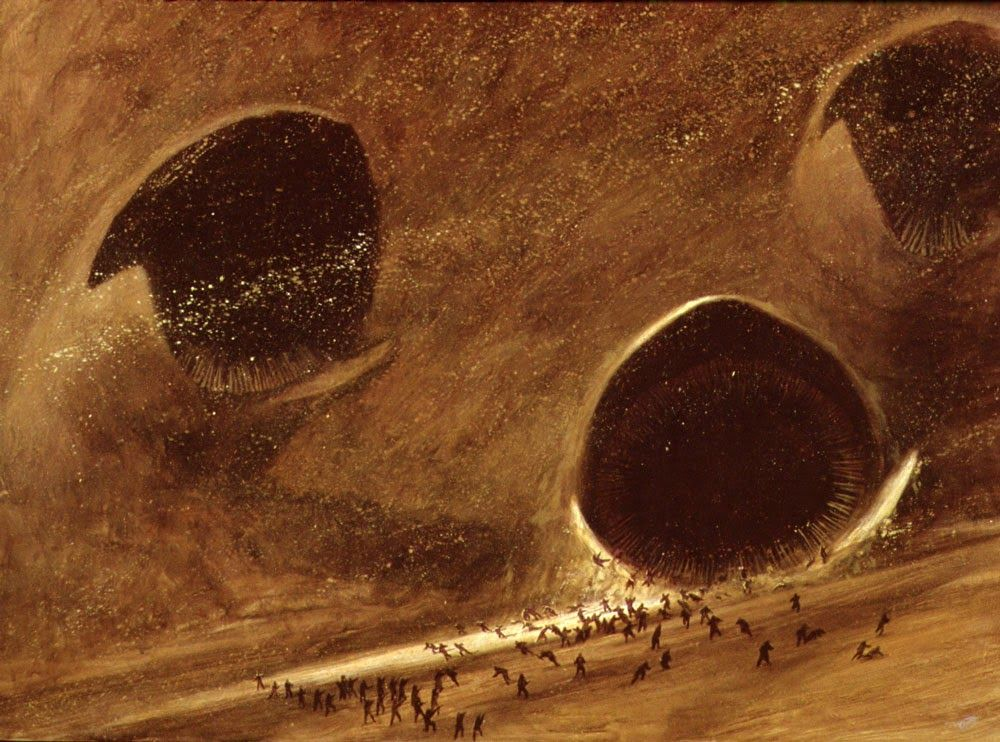
Concept art for the recent film version of Frank Herbert’s Dune; three monstrous sandworms terrorize some hapless extras.
Other science-fictional messiahs of the desert include the film Interstellar’s (2014) Joseph Cooper, a retired NASA pilot who left a desertified earth to find a new home for mankind. Even the music in Interstellar sounded religious, alternating gentle, pin-prick notes with arcing intervals crowned by organ chords. Its soundtrack merged the blaze of an overwhelming, epic scope with the “drip, drip, drip[s]” of quiet wonder. Cooper, too, grappled with an awesome monster whose maw swallowed any prey that came near it: Gargantua, a massive black hole that spun at nearly the speed of light.[7] Within its bizarre depths lay the key to unlocking the salvific riddle of space-time, just as the sandworms were vital to Dune’s most precious commodity and the universe’s “saving” grace: melange, or “the Spice.” One of the planets (Mann’s Planet) circling this sublime colossus was a completely frozen desert-like world. No nearby star provided any heat, and only Gargantua’s accretion disk provided its light. When descending into its atmosphere, Cooper’s space-craft Endurance[8] scraped against solidified clouds of dry ice (frozen carbon dioxide). Mann’s Planet, in fact, had no discernible surface, for it was “honeycombed with seemingly endless layers of frozen ice-cloud crevices and mountains” – a wasteland of horrific proportions.[9] Still, it retained a kind of surreal, bleak beauty similar to the arctic-volcanic far north of Scandinavia. The icy striations of Mann’s planet resembled those darkly ribboned surfaces created by the continual molten flows and hardenings of Icelandic lava fields.[10]
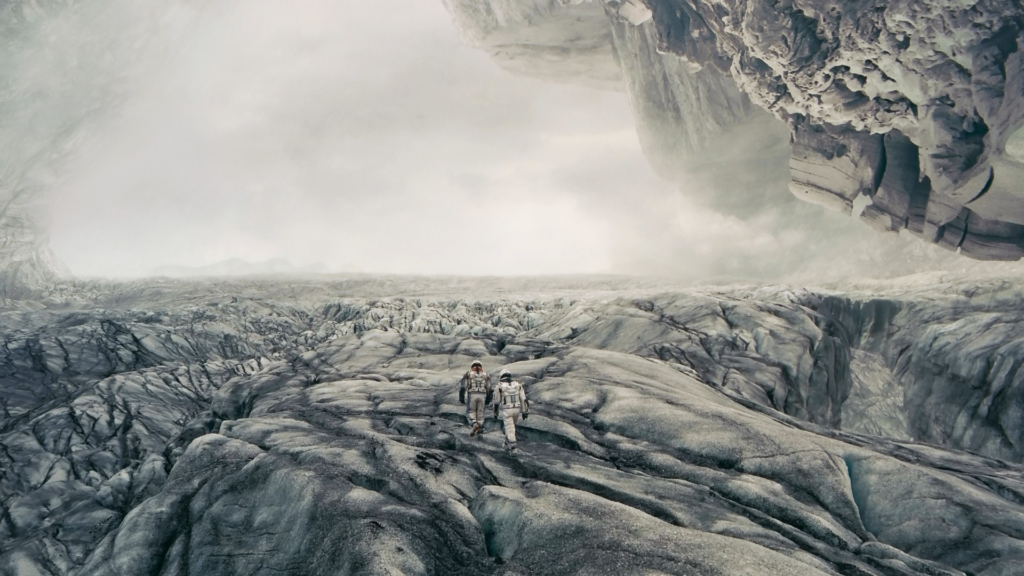
Mann’s Planet in the 2014 film Interstellar; this alien landscape is based on Iceland’s lava fields.
As Napoleon’s own vessel, l’Orient beached near Alexandria, a short march north of the “monstrous” Abdul-hol, the general quickly realized that he would have to become a savior in the eyes of Egypt’s intensely religious people. He’d prepared for an opportunity like this for years. While attending a military academy in his youth, Napoleon wrote several essays and short stories, some more revealing than others. Among them was “Le masque prophéte,” or “The Prophet Mask,” in which a handsome, charismatic zealot (Hakem) who preached an extremist brand of Islam, gathered many thousands of Iranian followers to wage holy war on the kingdoms to the west. His most formidable foe was the Caliph of Baghdad, a just ruler interested in “progress” and encouraging “the arts to flourish.” For a time, Hakem’s fanatics seemed on the cusp of victory. But soon, disease and the rigors of war took a heavy toll on the prophet’s numbers. Hakem, too, suffered a debilitating illness that wrecked his face. No longer was he the “handsomest of the Arabs.” Believing that the remainder of his warriors would abandon him if he showed them his scarred visage, Hakem fashioned for himself, then wore a silver mask. Once again, he addressed his followers in his hypnotic voice, persuading them that he appeared that way so that Allah’s glorious light radiating from his face did not render them sightless. But his words, they had yet enough power to blind them:
Last night [comrades], as you were sleeping unawares, I prostrated myself and besought God . . . A moment later, I heard a voice saying to me: “Hakem! Only those who have not left you are your true friends and only they are chosen. They will share with you the riches of your sumptuous enemies. [Have them] dig wide ditches, and your enemies will come rushing into them like flies stunned by smoke.”[11]
After his men dutifully dug the ditches and filled them with lime, they sat down to a meal that their leader had secretly poisoned. When all of Hakem’s jihadis gurgled their last breath and slumped over the table, the false prophet pushed them into their own freshly-dug holes. The lime began dissolving their corpses. Hakem set them aflame, then jumped into the maelstrom himself. When the Caliph came rushing into the fortress, he found only ruins. Even now, Hakem’s “cultists believe they are taken to heaven with [the rest of] his [chosen ones].” Napoleon’s narrator marveled, “Cet exemple est incroyable. Jusqu’où peut pousser la fureur de l’illustration [This example is incredible. How far can the passionate fury of being glorious lead one]!”[12] While in Egypt, Napoleon would play the roles of both caliph and prophet, the “enlightened despot” and the messiah. On occasion, he even wore the mask of “cold command” etched so permanently on the faces of Ozymandias and the “Father of Terrors.”
Revolutionary principles laced the French invasion with a benevolent sheen. Napoleon had arrived to drive the oppressive Mamluks out and to “civilize” Egypt; once ensconced at the capital of Cairo, he passed European-style reforms and established European institutions: a postal service, several large hospitals, effective waste removal, street lighting, a night watch, and a newspaper (Le Courier de l’Egypte). Of course, he wanted the arts and letters to “flourish” in Egypt once again by establishing his L’Institut de l’Egypte. In the first proclamation he prepared for the townspeople, the general was conciliatory: “O ye Egyptians!” “In the name of God, the Merciful, the Compassionate. There is no god but God. He has no son, nor has He an associate in His domain.” Slanderers have told you
“that I have not made an expedition hither for any other object than that of abolishing your religion; but this is a pure falsehood . . . I come to you only to rescue your rights from the hands of the oppressors.”[13]
Napoleon was savvy, and used an affected Oriental style to form words that were familiar to the natives, ending his announcements with a phrase from the Koran, God is great, and Mohammed is his prophet. He succeeded in flattering them (to some extent). A few even began to refer to him as “Sultan El-Kebir,” (King of Fire), or the more religiously-inflected “Mahdi” (the latter strikingly similar to Herbert’s “Muad’dib”). In between decrees, he climbed the pyramids of Giza, making sure he had an audience for this show of virility. By December of 1798, his addresses became explicitly messianic. God, he claimed,
has decreed for eternity that I come from the West to the land of [Egypt] to destroy [her enemies] . . . Know that I am able to reveal what is in every one of you because by looking at a person I can know everything about him . . . there will come a time and a day when you will see clearly that everything I have done and ordered is by irrevocable divine order.[14]
For Muslims, conquest of enemies and meting out justice determined the legitimacy of a prophet, and Napoleon also needed to strike fear into desert hearts. He recalled having no choice but to lop off “five or six heads” per day and affix them to Cairo’s public walls – a time-honored Egyptian practice. For the Muslims, “to obey means to fear.”[15] Thus, the general hired scribes to praise his military feats in the rousing, high-flown language that Mohammedans favored. “Mahdi” Bonaparte’s arrival marked the dawn of “times predestined by Allah . . . The star of victory which lights up the French warriors is resplendent in its fires.” At their head marches a “chieftain who . . . is impetuous; terror bends the foreheads of kings before him,” for they know they bow to the “lion of battles . . . destruction falls on him who declares himself an enemy.” Millions hasten unto him, “while the seas simmer under his ships.” From “the cup of bitterness,” Sultan Kebir “drenches his enemies [and] . . . disperses [them] in the deserts.” Ages hence, it will become common practice to say of this moment: “May God preserve you from such a day!”[16] Crazy talk. Napoleon was all things at once – generous, salvific, and terrible – the three great traits required to woo these desert natives. See how “Allah’s order has been accomplished!”
Neither did Napoleon restrict his public relations campaign to Egypt. The following year, he and a contingent of his troops crossed the Sinai Desert and into the Holy Land. There, he channeled Jesus Christ, Himself. At Jaffa, the general visited a pesthouse and passed through the miserable rows of plague sufferers, many of whom stretched out their hands to receive the traditional benediction of a divinely-sanctioned king. Napoleon removed his glove and touched the bare skin of a scrofula victim, so that the man might be healed. Though his Oriental campaign was ultimately a failure (largely due to British naval victories in the Mediterranean), his exploits in Egypt and the Middle East made him a popular hero in France. The moment he returned to Europe could not have been more propitious. The ruling Directory had become very unpopular. This time, the proclamation he prepared was for the French people. After wandering the wilderness, he had come to save the nation. Factions in national leadership “agreed on one thing only, that the Constitution was half-dead and could not secure freedom.” Every party “sought my support,” he claimed, “[but] I refused to be the party man.” A “restoration” required steadiness that was “free from all corruption” and petty wrangling, i.e., free from any current member of government, except himself.[17] On the “18 Brumaire” (November 9, 1799), Napoleon executed a coup d’etat that would culminate in his coronation as Emperor. The French people were ever after prone to seeing this desert wanderer as a Christ-figure, Prometheus, and god-emperor in one extraordinary person. Sometimes, his greatness seemed monstrous.
A French intellectual of the early twentieth century captured this hold Napoleon still enjoyed over the collective imagination: “He stands apart like Jesus. [Buddha] is far from us, lost in the musky fog of Asia’s marshes. Mohammed is no more than a lawgiver.” Great artists and philosophers, like Michelangelo and Plato worked “outside the plan of action. They [dreamt] it, whereas Christ and Napoleon act[ed] out their dream[s] . . . between these two summits everyone hesitates.” Both desert messiahs “explored to the outer limits” a literal wilderness and their own natures, ones “so generous . . . that they drove each of them to invade everything about them, to consume everything with their fire, including the crowds that followed them, even themselves.”[18] T. E. Lawrence made a similar remark in his memoirs of the Arab Revolt. While
[a]ll men dream, [they do not dream] equally. Those who dream by night in the dusty recesses of their minds wake in the day to find that it was vanity: but the dreamers of the day are dangerous men, for they may act their dream with open eyes, to make it possible.[19]
God-men like this are lone “shades, known below by Prometheus.”[20] There is that paired image again, of blinding day and the dark crevasse whose shade is a cathedral of relief – an image that makes sense only in a place like the desert.
To the very hour of his death, Napoleon was convinced that he “would have done better to remain in Egypt.” If he’d held Cairo, by now he “would have been emperor of all the East,” instead of a prisoner on an island where only the mosquitos had a kingdom. I suspect that the strangely haunting quality of the desert was partly responsible for his mind’s continual return to Oriental regrets. If only Alexandria were his, it would be “one of the most beautiful fortified spots in Europe.” Water from the Nile via a state-of-the-art canal system would have turned it into an emerald garden on the coast – a jewel of an oasis whose vibrance would be all the more splendid for its setting in the midst of endless ochre-yellows and umbers. “If only Acre had fallen, I would have changed the face of the world.”[21] Jusqu’où peut pousser la fureur de l’illustration!
* * *
Like all journals of dissident ideas, Counter-Currents depends on the support of readers like you. Help us compete with the censors of the Left and the violent accelerationists of the Right with a donation today. (The easiest way to help is with an e-check donation. All you need is your checkbook.)
For other ways to donate, click here.
Notes
[1] Volney, 12, 52.
[2] Papyrus of Ani, Egyptian Book of the Dead, trans. E. A. Wallis Budge (originally written, ca. 240 BC).
[3] Christ’s wandering in the “wilderness” mirrored, then symbolically reversed, the Fall of Man, the latter precipitated by Adam and Eve’s failure to resist the devil’s temptation. As punishment, God cast them out of paradise and into the howling wilderness.
[4] Percy Bysshe Shelley, Prometheus Unbound (Boston: D. C. Heath & Co., 1892), 10.
[5] Frank Herbert, Dune (New York: Ace Penguin, 2019), 3.
[6] Ibid, 5, 47.
[7] For more on the speculative science of this film, see Kip Thorne’s The Science of Interstellar (New York: W. W. Norton & Co., 2014).
[8] The name of Ernest Shackleton’s ship that set out to brave the polar deserts.
[9] “Mann (planet),” Interstellar Wiki.
[10] This scene was actually filmed in Iceland.
[11] Napoleon Bonaparte, “Le masque prophète,” 2, 3.
[12] Ibid, 3.
[13] Abd Al-Rahman Jabarti, Napoleon in Egypt (Princeton, NJ: Markus Weiner Publishers, 2006), 32-33. Jabarti was a contemporary of Napoleon’s, and wrote a scathing eye-witness account of the French general’s exploits in the Sahara.
[14] Maya Jasanoff, Edge of Empire (New York: Vintage Books, 2005), 147.
[15] Strathern, 185.
[16] Nikoula-el-Turk in “Scientific and Military Extract of the French Expedition in Egypt.”
[17] Napoléon Bonaparte, “Proclamation du Général en Chef Bonaparte, 19 Brumaire,” L’Imprimerie de la République, November 10, 1799.
[18] Gérard Gengembre, Napoleon: the Immortal Emperor (New York: Vendôme Press, 2003), 170-171.
[19] Thomas Edward [T. E.] Lawrence, Seven Pillars of Wisdom (Victoria, Aus: Penguin, 1922), 23.
[20] Gengembre, 171.
[21] Strathern, 525-536.

